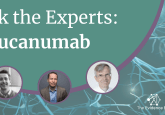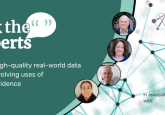Ask the Experts: applications of real-world data during – and beyond – COVID-19

In this ‘Ask the Experts’ feature, we explore some of the potential applications of real-world data and evidence during COVID-19, as well as the possible lasting implications the pandemic may have on the industry’s perception on the usability of these data, by posing some key questions to a panel of experts with diverse experiences.
Our experts for this instalment are Mitch DeKoven (IQVIA, VA, USA), Nicolle Gatto (Aetion, NY, USA) and Nirosha Mahendraratnam Lederer (Duke-Margolis Center for Health Policy, DC, USA). Take a look at the full discussion below to hear their insights!
Questions
Jump to:
![]() In the context of COVID-19, how has the regulatory landscape for therapeutics changed and how may real-world evidence be used to help fulfil approval requirements for potential COVID-19 treatments?
In the context of COVID-19, how has the regulatory landscape for therapeutics changed and how may real-world evidence be used to help fulfil approval requirements for potential COVID-19 treatments?
![]() How may analysis of real-world data help accelerate insights on COVID-19 treatment strategies and support physicians in better understanding and adjusting these?
How may analysis of real-world data help accelerate insights on COVID-19 treatment strategies and support physicians in better understanding and adjusting these?
![]() How has the COVID-19 crisis broadened the use and practical application of real-world evidence?
How has the COVID-19 crisis broadened the use and practical application of real-world evidence?
![]() What are some of the challenges associated with leveraging and analyzing real-world data for any of the above purposes?
What are some of the challenges associated with leveraging and analyzing real-world data for any of the above purposes?
![]() How could real-world data help supplement the clinical trial process during these times when trial recruitment and execution are especially challenging?
How could real-world data help supplement the clinical trial process during these times when trial recruitment and execution are especially challenging?
![]() What long-term implications do you think the pandemic may have regarding the industry’s perception on the usability of real-world data?
What long-term implications do you think the pandemic may have regarding the industry’s perception on the usability of real-world data?
![]() In the long-term, how could real-world data collected in international registries and datasets help inform future emergency responses?
In the long-term, how could real-world data collected in international registries and datasets help inform future emergency responses?
Meet the experts
 Mitch DeKoven
Mitch DeKoven
Mitch DeKoven is a Senior Principal in Health Economics and Outcomes Research within the Real World Insights division at IQVIA (VA, USA).
DeKoven holds a Masters Degree in Health Services Administration obtained from the University of Michigan School of Public Health (MI, USA) and has been with IQVIA for the past 13 years. He is also a member of our Expert Panel on The Evidence Base, sharing his expertise to help direct content and ensure that we focus on the most exciting areas and cutting-edge topics.
 Nicolle Gatto
Nicolle Gatto
Nicolle Gatto is the Senior Vice President of Scientific Research at Aetion (NY, USA). Gatto joined Aetion after working at Pfizer (NY, USA) for 20 years, leading epidemiology teams focused on regulatory and safety initiatives and providing strategic leadership on methods-related work. She obtained her PhD in Epidemiology from Columbia University’s Mailman School of Public Health (NY, USA), was named a Fellow of the International Society for Pharmacoepidemiology (MD, USA) and is also an Adjunct Assistant Professor of Epidemiology at both Columbia University and Tulane University (LA, USA), teaching courses in pharmacoepidemiology, causal inference and confounding control methods.
At Aetion, Gatto serves as a senior scientific voice within the organization, helping advance research with a team of pharmacoepidemiologists, clients and partners. Aetion delivers real-world evidence for biopharmaceutical companies, regulators, health technology assessment bodies and payers. The Aetion Evidence Platform® analyzes data from the real world to produce transparent, rapid and scientifically validated answers on costs and outcomes. Aetion has a few ongoing partnerships with the US FDA, including the RCT DUPLICATE demonstration project, which is to help inform the agency’s forthcoming guidance on real-world evidence. Aetion also recently entered into a research collaboration agreement with the FDA to use real-world data to advance the understanding of – and response to – COVID-19. Further, it is working with the Institute for Clinical and Economic Review (MA, USA) to generate real-world evidence for its value assessments.
 Nirosha Mahendraratnam Lederer
Nirosha Mahendraratnam Lederer
Nirosha Mahendraratnam Lederer is a health outcomes researcher by training with a passion for health policy, currently affiliated with the Duke-Margolis Center for Health Policy (DC, USA) where she oversees the Real-World Evidence portfolio.
The Robert J. Margolis MD Center for Health Policy (DC, USA) brings together expertise from the policy community in Washington (DC, USA), Duke University and Duke Health (both NC, USA) to address the most pressing issues in health policy.
At the Center, Lederer and colleagues are focused on policies to enhance real-world data capture and their analysis, to generate high-quality, credible real-world evidence that can be used by decision-makers including regulators, payers, providers and patients to improve the healthcare system.
In the context of COVID-19, how has the regulatory landscape for therapeutics changed and how may real-world evidence be used to help fulfil approval requirements for potential COVID-19 treatments?
Mitch DeKoven: As we all know in this environment, it is all about finding the right balance between speed and safety/quality when it comes to approvals for potential COVID-19 treatments. One of the ways we will be able to accelerate regulatory approval and bring critical treatments of COVID-19 to patients faster, is by embracing real-world data, which quickly delivery insights about safety and effectiveness in multiple types of patients. Real-world data – and the subsequent real-world evidence generated from their analysis – collected in real time and with little lag, will prove extremely valuable in the pursuit of such treatments.
“One of the ways we will be able to accelerate regulatory approval and bring critical treatments of COVID-19 to patients faster, is by embracing real-world data, which quickly delivery insights about safety and effectiveness in multiple types of patients,”
– Mitch DeKoven.
Nicolle Gatto: The FDA and other regulatory bodies have committed to exploring the use of real-world evidence in decision-making. We have heard the FDA state (many times) in public presentations that it is learning along with us about how to incorporate real-world evidence in its decision-making and is asking that we provide use cases for real-world data to support clinical development. The COVID-19 pandemic has accelerated this – Dr. Amy Abernethy, the Principal Deputy Commissioner of the FDA, commented that, even before the pandemic, there had been a shift toward more efficient drug development. With COVID-19, we are seeing this play out at scale and I think there will be an acceleration of the use of real-world data in drug development.
With all of the medicines being used to treat COVID-19 in routine practice – and the rapid development of potential treatments and vaccines – we need to use real-world data to help understand their safety and effectiveness in the real world. In some cases, we will also need real-world data to provide comparators for longer-term trial data.
Aetion recently signed a research collaboration agreement with the FDA to use real-world data to advance the understanding of – and response to – COVID-19. As part of that work, we are characterizing the natural history of COVID-19 as well as the effectiveness and safety of potential treatments in very large, nationally representative datasets. As we learn more, we can try to understand the impact of various treatments in geographic or demographic subgroups, and of differences in timing, dose and length of use in routine COVID-19 care. These insights should ultimately inform FDA decision-making, as well as decision-making at the individual level, between the patient and physician, impacting public health at multiple levels. We expect that other global regulators will be open to real-world data and evidence submissions in the context of COVID-19, to help contextualize treatments, diagnostics and vaccines.
“…I certainly don’t think that real-world data and evidence will replace clinical trials; I think the intention is to identify the areas where real-world data can best supplement what we are learning from traditional clinical trials,”
– Nicolle Gatto.
I think that, in 5 years, we will have greater knowledge about when real-world data and evidence can be useful and valid, as well as what is acceptable to regulators and how much uncertainty they can allow. I have high hopes, but I certainly don’t think that real-world data and evidence will replace clinical trials; I think the intention is to identify the areas where real-world data can best supplement what we are learning from traditional clinical trials.
Nirosha Mahendraratnam Lederer: For COVID-19 therapeutics, there are potentially three scenarios where real-world evidence can be used to help fill evidence gaps: first, in the context of new approvals likely based on evidence of safety and efficacy of a potential intervention in narrow COVID-19 patient populations and treatment contexts. Second, with regards to emergency use authorizations for treatments with promising clinical results before trials are complete and, finally, in the context of repurposed products already on the market being used off-label.
“Not only are we in the midst of a pandemic, but we are fighting a novel disease. We must capitalize on all available data to help enhance our understanding of the disease and treatment outcomes, regardless of whether they are generated in the trial setting or the real-world setting,”
– Nirosha Manhendraratnam Lederer.
Compared with newly approved or emergency use authorization therapies, there will be a better understanding of repurposed therapies’ safety profiles due to both the clinical trials that informed their original approval and data collected in the real world. This understanding of safety will depend on how long the product has been on the market and its uptake.
How may analysis of real-world data help accelerate insights on COVID-19 treatment strategies and support physicians in better understanding and adjusting these?
Mitch DeKoven: Alongside data obtained from randomized clinical trials, real-world data can play a significant role in helping better understand patient demographics, clinical characteristics, associated health outcomes and costs, which in turn can provide physicians and other stakeholders with a more accurate and more refined sense of what treatments work for which patients and why. Over time, as more accumulate, real-world data will provide important insights into the long-term clinical impacts of COVID-19.
Nirosha Mahendraratnam Lederer: Not only are we in the midst of a pandemic, but we are fighting a novel disease. We must capitalize on all available data to help enhance our understanding of the disease and treatment outcomes, regardless of whether they are generated in the trial setting or the real-world setting. This information should be used to adapt clinical practices in real time. This is not a new concept – in the USA, we are already working toward a learning healthcare system – however, COVID-19 has accentuated the need to do so and accelerated its progress. The trick is to make sure the right data are being paired with the right questions; of course, this is contingent on the data being fit for use, as well as the use of credible study designs and analysis methods.
How has the COVID-19 crisis broadened the use and practical application of real-world evidence?
Mitch DeKoven: The FDA’s increased use, as well as increased use of real-world evidence as external comparators within clinical trials, demonstrate the utility and acceptability of real-world evidence in recent years. The timing could not be better for real-world evidence to play a key role in COVID-19 research. The data are timely, longitudinal and enable the study of large cohorts of patients at once.
Nirosha Mahendraratnam Lederer: I am encouraged by the speed of real-world data and evidence activities taking place in the COVID-19 space. I am also really inspired by the unprecedented collaboration between stakeholders – including between competitors – who have come together to help understand and treat COVID-19.
“I am…inspired by the unprecedented collaboration between stakeholders – including between competitors – who have come together to help understand and treat COVID-19,”
– Nirosha Mahendraratnam Lederer.
One example that comes to mind is the COVID-19 Evidence Accelerator, a collaborative project jointly organized by the Reagan-Udall Foundation for the FDA and Friends of Cancer Research (both DC, USA), which is working closely with the FDA to bring together a range of data organizations, researchers and other experts to rapidly assess COVID-19 diagnostics and treatments through parallel analyses and lab meetings. Another example is the COVID-19 Healthcare Coalition’s Optimization of Clinical Therapeutics and Protocols Working Group, which is bringing together electronic health record and healthcare analytics data stakeholders to run federated analyses to answer key COVID-19 questions.
What are some of the challenges associated with leveraging and analyzing real-world data for any of the above purposes?
Mitch DeKoven: All real-world data need to be analyzed with the appropriate scientific rigor in order to overcome and allay any concerns regarding data quality, bias, etc. Real-world data studies should be designed that adhere to accepted research standards, such as those the International Society for Pharmacoeconomics and Outcomes Research (NJ, USA) has established. All such studies have associated limitations, however, minimizing them – while being transparent – is key to the acceptability and interoperability of the data.
Nicolle Gatto: Standards are certainly a key issue, especially given that COVID-19 is a novel disease and we are moving at a rapid pace. The COVID-19 Evidence Accelerator, organized by the Reagan-Udall Foundation for the FDA and Friends of Cancer Research (both DC, USA), convenes leaders in the healthcare data and analytics space to answer key questions about COVID-19 with real-world data. By banding these organizations together, the project aims to create a shared learning environment that maximizes the impact of members’ individual efforts. Together, via dedicated therapeutics and diagnostics workgroups, participants aim to advance the methods used to turn a range of real-world data into actionable COVID-19 insights. The first set of analyses for the COVID-19 Therapeutics Evidence Accelerator’s Parallel Analysis Workgroup focused on the following research question: among patients with COVID-19 infection and treated with hydroxychloroquine in an inpatient setting, what are typical treatment patterns, co-medications and effects on select health outcomes? Several organizations investigated this research question in parallel using their own real-world data and then came together to discuss their findings and challenges.
“Standards are certainly a key issue, especially given that COVID-19 is a novel disease and we are moving at a rapid pace,”
– Nicolle Gatto.
Even in this open collaboration, with frequent information sharing, it can be difficult to apply standards across datasets and methods. The hydroxychloroquine analyses served as a great test case and the lessons learned will be applied to other research questions as we move forward.
Nirosha Mahendraratnam Lederer: The potential challenges associated with using real-world data and evidence to tackle questions about COVID-19 are no different than those associated with use of these data in other disease specialties pre-COVID, however, the urgency associated with COVID-19 is speeding up the data and evidence generation processes.
Because their utility to decision-makers has increased, the community must take care not to sacrifice real-world data and evidence quality for speed. This includes implementing best practices related to transparency (e.g., Real-World Evidence Transparency Initiative), data entry, data curation (e.g., a minimum set of reliability checks), study design (e.g., the TARGET Trial Framework, design diagrams) and analysis. Building on prior work and recommendations in this space, development and implementation of a master COVID-19 real-world evidence protocol – with aligned data and methods or data model translation tables – can improve the quality of both COVID-19 real-world data and evidence.
How could real-world data help supplement the clinical trial process during these times when trial recruitment and execution are especially challenging?
Mitch DeKoven: Trials may employ ‘external comparators’ to help evaluate the effectiveness of an intervention. These are patient cohorts from outside of the trial, generated from other trials or retrospective/observational real-world data, which are used to make indirect comparisons with the trial cohort or to serve as real-world benchmarks.
Nicolle Gatto: In my vaccine work at Pfizer, in addition to developing indicated and trial-like cohorts to provide context for safety imbalances in Phase II/III trials, we sometimes used real-world data to help characterize the population at risk before first-in-human trials. This type of work allows us to characterize the population for a Phase II or Phase III clinical trial as one that is broad, but still at sufficient risk of the outcome, to allow timely completion of the trial.
“If we do this right, we will not only answer critical public health pandemic research questions, but we can also learn a lot about how to use external comparators in a highly valid and transparent way that supports regulatory decisions,”
– Nicolle Gatto.
With COVID-19, many companies have designed and implemented trials quickly for products (or vaccines) with the potential to treat or prevent COVID-19. However, they may face challenges with trial planning and patient recruitment. While vaccines are being tested in randomized controlled trials, there may be an opportunity for us to further explore the use of external comparators to contextualize trial data, extend our understanding of the natural course of COVID-19 and better understand the safety and effectiveness of treatments. It is highly likely that efficacious vaccines will be quick to reach the market, making post-approval safety and effectiveness data over longer-term follow-up and in more diverse populations critical to the COVID-19 vaccine story.
If we do this right, we will not only answer critical public health pandemic research questions, but we can also learn a lot about how to use external comparators in a highly valid and transparent way that supports regulatory decisions.
Nirosha Mahendraratnam Lederer: The University of Oxford’s (UK) RECOVERY trial program – a large, practical, adaptive trial – is one incredible example of this. By harnessing the power of randomization, identifying key objective outcomes and leveraging a large sample size, investigators were able to conduct a powerful trial in the real-world setting that required few data elements.
“The knowledge, infrastructure and partnerships that have developed as a result of the pandemic have advanced the field,”
– Nirosha Mahendraratnam Lederer.
At a time where there are limited resources and providers are overextended, any efforts to limit provider burden – for example, by reducing additional data collection – are necessary. Given that the healthcare system and data infrastructure are different in the UK, the Duke-Margolis Center for Health Policy is exploring how to implement a practical trial like RECOVERY in the USA.
What long-term implications do you think the pandemic may have regarding the industry’s perception on the usability of real-world data?
Mitch DeKoven: I think that the pandemic will further solidify the importance of real-world evidence in research moving forward. The timeliness, quality and scientifically rigorous nature of the data will solidify their place in the research paradigm in the future.
“I think that the pandemic will further solidify the importance of real-world evidence in research moving forward,”
– Mitch DeKoven.
Nirosha Mahendraratnam Lederer: Data collected in the real world and in clinical trials are highly complementary. The COVID-19 pandemic has highlighted the types of evidence gaps that real-world data and evidence can fill. The knowledge, infrastructure and partnerships that have developed as a result of the pandemic have advanced the field. I am optimistic that decision makers have learned more about real-world data and evidence and how they can be used, and researchers will continue to implement best practices going forward.
In the long-term, how could real-world data collected in international registries and datasets help inform future emergency responses?
Nicolle Gatto: Having quality, large-scale data sources at our fingertips enables us to quickly assess the situation and learn through real-world data. At Aetion, we are committed to advancing global standards for knowing how and when to turn real-world data into decision-grade evidence at scale – progress that will be essential in helping us address future public health crises.
Nirosha Mahendraratnam Lederer: Any data infrastructure put in place today can hopefully be easily adapted for future emergency responses. However, equally as valuable are the relationships and partnerships themselves, which are essential for creating alignment on what data should be captured, fostering a willingness to share data and reducing redundancies in – and streamlining – data capture. Trust in partners is integral to all of this.
Disclosures:
The opinions expressed in this feature are those of the interviewees/authors and do not necessarily reflect the views of The Evidence Base® or Future Science Group.
Nicolle Gatto is an employ of Aetion.
Nirosha Mahendraratnam Lederer has no financial or competing interest to disclose.
Enjoyed this feature and interested in partnering with The Evidence Base? Contact us today >>>



